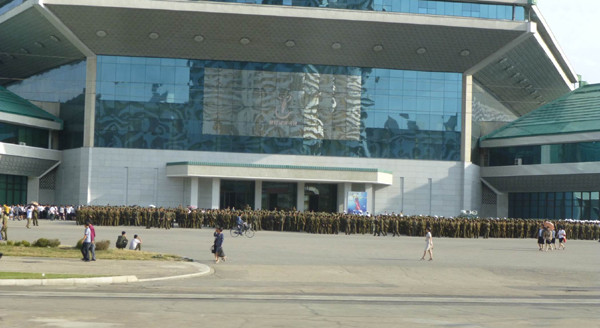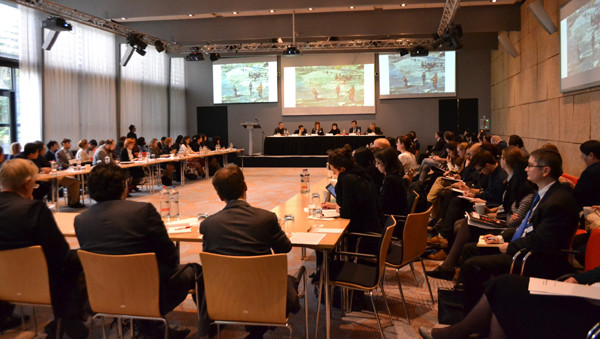Dedicated to Human Rights in North Korea
‘사람’ : 북한 인권을 위해 일하는 베를린의 비정부기구(1)

Saram (사람, “people” in Korean) is an NGO based in Berlin that promotes human rights in North Korea. It sounds anomalous that a German NGO would be involved in the issue of human rights under the Kim Jong-un regime, but the group, largely comprised of volunteers, has very compelling reasons to do so.
I first met Nicolai Sprekels, the founder and spokesperson of Saram, when I was working on my master’s degree in Berlin. Sprekels and his team brought two North Korean defectors to my university to speak at a human rights conference, and the stories they told of the horrible conditions within the country and of their harrowing experiences escaping the country, being captured, and escaping again, literally had the audience in tears.
Saram, an independently funded NGO, operates out of a refurbished World War II bunker, where it regularly hosts events that draw attention to the human rights atrocities that are buried in the deluge of mass media and second- or third-hand information that people usually read about North Korea. Saram also carries out international initiatives that go well beyond the platitudes expressed by the so-called pundits so regularly seen on television.
In late 2019 and early 2020, Sprekels spent a number of weeks in Seoul meeting with various interest groups and was later joined by Saram Director Franziska Gregor. I met with Sprekels and Gregor in Seoul in February to hear what they had been up to.
Gwangju News (GN): Thank you, Nicolai and Franziska, for meeting with me. To start off, what is Saram and what does it do?
Nicolai Sprekels: Saram is a team of mostly German people, mostly in Berlin. We also have a North Korean on our team, and there are a few people around the world cooperating with us. We started about six years ago and believe that people around Germany and Europe should try to improve human rights in North Korea. At first, we only sought out information about North Korea and were learning how to verify it. When Kim Jong-il died, that was the moment we decided to really get active and form an NGO. Two years ago, we changed from an NGO to a foundation. Since then we have been able to engage in a lot more dialogue with German officials and big institutions in human rights.
GN: You are based in Berlin. Why do you care what happens in North Korea, and why is it important for people in Europe to understand what is going on there?
Sprekels: There are two answers to that. First, most people here [in South Korea] are probably not aware that relations between the Democratic People’s Republic of Korea (DPRK) and the European states, particularly Germany, are quite close and stable in many ways. There is a lot of dialogue, exchange, and humanitarian aid programs. They are very complex relations, but what is important to understand is that the DPRK had partner states in Europe when Germany was still divided. East Germany supported the DPRK and helped it rebuild after the Korean War. So many people in North Korea have a very good impression of Germans. After German reunification, Germany maintained diplomatic relations, and today Germany is the only country that has an accepted, official human rights dialogue with the DPRK. For these reasons, Germany has a chance to improve human rights issues in the DPRK, but to do so we need many more people, rather than just a few politicians, to be aware of the situation and the political aspects.
Franziska Gregor: Also, a number of people who work for our foundation, myself included, are from East Germany. So, we have a closer relationship to the topic than people from other European countries because we are more familiar with the special relations that Nicolai just mentioned.
Sprekels: The second reason has to do with World War II and the road Germany took. I think everyone around the world is aware of the immense crimes committed by the Nazi Party, including the Holocaust and the murder of all kinds of unwelcome people by that regime. After the total defeat of the Nazis, a process of complete change in Germany started along with a rethinking of how to deal with regimes like that. Today, Germany is a state that feels an urgent responsibility to prevent these kinds of human rights violations. The slogan repeated by German politicians all the time is “Never Again,” which refers specifically to concentration camps.
Gregor: It is our position that Germany has a special responsibility, because of the Second World War, to prevent these kinds of situations around the word.
GN: Why is it important to not listen to so-called “experts” on North Korea, and who should people be listening to in order to get a clear picture of the situation in the DPRK?
Sprekels: If we had listened to and believed the information from European experts, we never would have started an NGO. European experts do not meet defectors and the info we got from defectors was the opposite of the statements made by the supposed experts. The reports by defectors were so shocking we hesitated to believe them at first, but the gap between the views of the European experts and the defectors was so wide we decided the only approach was to get to know defectors. We use scientifically obtained information from defectors, meaning we are closer to understanding what is really going on than the experts are. For example, we know beyond a shadow of a doubt there are over 100 thousand people living in prison camps in terrible conditions in North Korea.
Gregor: There is no free movement in North Korea. So, there is no way for experts who have visited to be sure if what they were being told [by DPRK representatives] was actually happening. Just as well, some of the German experts actually worked for the East German government. They visited the DPRK as government guests and were certainly not neutral. We are kind of like independent journalists in the sense that we try to verify defector stories.
(to be continued)
Interview by William Urbanski
The Author
William Urbanski, managing editor of the Gwangju News, has an MA in International Relations and Cultural Diplomacy. He is married to a wonderful Korean woman, always pays cash and keeps all his receipts.
*This article was originally published in Gwangju News March 2020 issue.
Gwangju News is the first public English monthly magazine in Korea, first published in 2001 by Gwangju International Center. Each monthly issue covers local and regional issues, with a focus on the stories and activities of the international residents and communities. Read our magazine online at: www.gwangjunewsgic.com
-원문 해석-

‘사람’은 북한의 인권을 추구하는 베를린에 본부를 둔 NGO입니다. 독일의 NGO가 김정은 정권 하의 인권 문제에 관계한다는 것은 이상하게 들릴 수 있지만, 대부분 자원 봉사자들로 구성된 이 단체는 그럴 만한 이유가 있습니다.
저는 베를린에서 석사 학위과정을 할 때 ‘사람’의 창립자이자 대변인이던 니콜라이 스프렉클스(Nicolai Sprekles)를 처음 만났습니다. 스프레클스(Sprekles)씨와 그의 팀은 북한의 탈북자 2명을 우리 대학의 인권 학술회의에 데려왔습니다. 그들 탈북자들은 북한의 끔찍한 상황과 북한을 탈출하던 비참한 경험, 붙잡혔다가 다시 탈출한 이야기를 전해주었는데, 말 그대로 청중은 눈물을 흘렸습니다.
‘사람’은 독립적인 자금으로 운영되는 NGO로 2차 세계전쟁 때의 벙커를 재단장한 곳에서 운영되며, 북한에 대해 일반적으로 읽는 대중 매체의 홍수와 두세번째 정보로 묻혀버리는 인권 잔학상에 사람들이 관심을 갖도록 하는 행사를 정기적으로 개최합니다. ‘사람’은 또한 텔레비전에서 정기적으로 볼 수 있는 소위 전문가가 진부한 이야기를 표현하는 것 이상의 국제 이니셔티브를 수행하고 있습니다.
2019 년 말과 2020년 초, Sprekles는 서울에서 몇 주 동안 여러 이해 단체들과 회의를 하며 ‘사람’의 이사인 Franziska Gregor와 합류했습니다. 저는 서울에서 Sprekles와 Gregor를 만나서 그들이 그동안 무엇을 해왔는지에 대해 인터뷰했습니다.
-‘사람’은 무슨 단체고, 무슨 일을 하나요?
△니콜라이 스프렉클스: 저희는 베를린에서 주로 독일인으로 구성된 팀입니다. 또한 우리 팀에 한분의 북한주민도 있으며 전 세계에 우리와 협력하는 몇명의 회원이 있습니다. 저희는 약 6년 전에 시작했으며 독일과 유럽 사람들이 북한의 인권을 개선하기 위해 노력해야한다고 믿습니다. 처음에는 단순히 북한에 대한 정보만을 검색하고 그것을 검증하는 방법에 대해서만 연구하였습니다. 김정일 사망한 시기에, 실질적인 활동을 하기로 결정하고 NGO를 결성했으며 2년 전 NGO에서 재단으로 개편했습니다. 그 이후로 우리는 인권에 대하여 독일 공무원과 대형 기관과 더 많은 논의를 진행할 수 있었습니다.
-당신들은 베를린에 거주하고 있습니다. 왜 북한에서 일어나는 일에 신경을 쓰시나요? 유럽 사람들이 북한에서 무슨 일이 일어나고 있는지 이해하는 것이 중요하다고 생각하는 이유는 무엇입니까?
△니콜라이 스프렉클스: 그것에 대해 두 가지로 답할 수 있겠습니다. 첫째, 한국에 사는 대부분의 사람들은 아마도 조선 민주주의 인민공화국 (DPRK)은 유럽 국가, 특히 독일과 여러 면에서 매우 밀접하고 안정적 관계를 갖고 있다는 사실을 모르고 있습니다. 대단히 많은 대화, 교류, 그리고 인도주의적 원조 프로그램이 진행되고 있습니다. 이는 매우 복잡한 관계 속에 있지만, 독일이 분단되어있을 때 북한은 유럽에 여러 협력국가가 있었다는 것은 이해하셔야 할 중요한 부분입니다. 한국 전쟁 후 동독은 조선 민주주의 인민공화국을 지원하고 재건을 도왔습니다. 이로 인해 많은 북한주민은 독일인에 대해 아주 좋은 인상을 갖고 있습니다. 독일 통일 후에도, 독일은 외교 관계를 유지해왔으며 현재 독일은 북한과 공식적 인권 대화를 승인한 유일한 국가입니다. 이러한 이유로, 독일은 북한의 인권 문제를 개선할 수 있는 기회가 있지만, 그렇게 하려면 단지 소수의 정치인이 아니라 이런 상황과 정치적 측면을 인식 할 수 있는 사람들이 훨씬 더 많아져야 합니다.
△프랜치스카 그레거: 또한 저를 포함해 우리 재단을 위해 일하는 많은 사람들이 동독 출신입니다. 그래서 우리는 니콜라이가 방금 언급한 특별한 관계에 더 익숙하기 때문에 다른 유럽 국가의 사람들보다 우리가 이 주제에 더 밀접하게 관련하고 있습니다.
△니콜라이 스프렉클스: 두 번째 이유는 2차 세계대전과 독일이 취한 길과 관련이 있습니다. 전 세계의 모든 사람들이 홀로코스트와 그 정권에 의한 모든 종류의 환영받지 못한 사람들의 살인을 포함하여 나치당이 저지른 강렬한 범죄를 알고 있다고 생각합니다. 나치의 총 패배 이후 독일의 완전한 변화 과정은 그러한 정권을 다루는 방법을 다시 생각하면서 시작되었습니다. 오늘날 독일은 이러한 종류의 인권 침해를 방지해야 할 긴급한 책임이 있는 국가입니다. 정치인들이 항상 반복하고 있는 슬로건은 “다시는 반복하지 말자”이며, 이는 특히 강제 수용소를 의미합니다.
△프랜치스카 그레거 : 제2차 세계 대전으로 인해 독일은 이러한 상황을 막기 위해 특별한 책임을 가진다는 것이 우리의 입장입니다.

-소위 북한 ‘전문가’의 말을 듣지 않는 것이 왜 중요합니까? 북한의 상황을 명확하게 파악하기 위해 사람들은 누구의 말을 들어야 하는가요?
△니콜라이 스프렉클스 : 저희가 북한 전문가의 정보를 듣고 믿었다면, 저희는 결코 NGO를 시작하지 않았을 것입니다. 북한 전문가들은 탈북자를 만난 적이 없고, 저희가 탈북자로부터 얻은 정보는 전문가의 진술과 정반대였습니다. 탈북자들의 보고서는 너무나 충격적이어서 처음에 그들을 믿기가 꺼렸지만, 전문가들과 탈북자들의 견해 차이가 너무 커서 우리는 탈북자들을 알아 가는 것이 유일한 접근법이라고 결정했습니다. 우리는 탈북자들로부터 과학적으로 얻은 정보를 사용합니다. 즉, 전문가보다 저희가 실제 진행 상황을 이해하는데 더 가깝습니다. 예를 들어, 우리는 의심 할 여지없이 북한에 끔찍한 환경의 감옥에 10만 명 이상의 사람들이 살고 있것을 알고 있습니다.
△프랜치스카 그레거 : 북한에는 자유가 없습니다. 따라서 방문한 전문가들은 북한 대표들이 말한 내용이 실제로 일어나는지 확인할 방법이 없습니다. 또한 독일 전문가 중 일부는 실제로 동독 정부에서 근무했습니다. 그들은 정부 국빈으로 북한을 방문했었으며 확실히 중립적이지 않았습니다. 우리는 탈북자들의 이야기를 확인하려고 애쓴다는 점에서 일종의 독립 언론인들과 같습니다.
(다음 회에 계속)
글·사진=William Urbanski (윌리엄 어반스키)
번역=유연우 (광주국제교류센터 자원활동가)
작가
광주 뉴스 편집장인 윌리엄 어반스키 (William Urbanski)는 국제 관계 및 문화 외교 분야에서 석사 학위를 취득하였습니다. 그는 훌륭한 한국 여성과 결혼했으며, 항상 현금을 지불하고 모든 영수증을 보관합니다.
*이 글은 광주뉴스 2020년 3월호에 실린 내용입니다.
광주뉴스는 광주국제교류센터가 2001년에 처음 발행한 대한민국 최초의 영문 대중월간지입니다. 매월 발행되는 각 호에는 지역에 거주하는 외국인과 지역민의 활동과 지역사회의 이야기 및 이슈를 다루고 있습니다. 온라인에서도 잡지를 볼 수 있습니다. (www.gwangjunewsgic.com)

